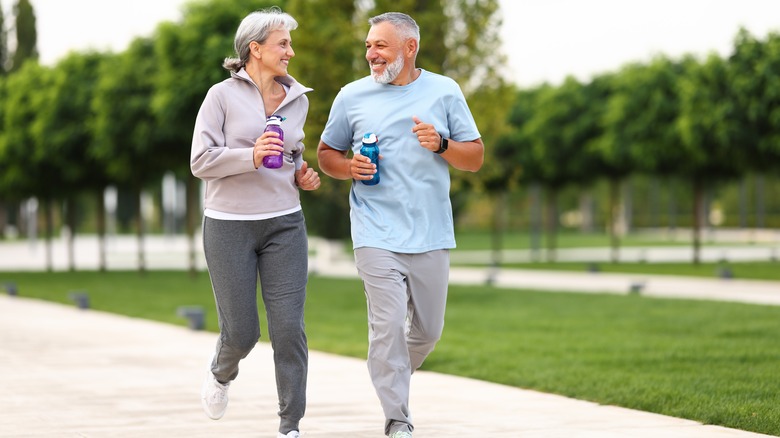Running Habits That Can Help Slow Down Aging
As we age, we begin to lose muscle and bone mass, and our risk of cardiovascular disease increases (via U.S. News & World Report). Our cognition also declines, and our decreasing social connections can make us feel more lonely and less motivated to maintain our health. A regular exercise program can stave off many of the signs of aging. Weight-bearing exercise such as running protects muscle mass and improves bone density (via Time). Exercise overall improves cognitive function and lengthens telomeres, which help protect against high blood pressure, stroke, and heart disease.
Runners over 50 know they are helping their bodies by improving blood flow and oxygen to their brain, heart, and organs (via WebMD). Runners live on average three years longer than non-runners, according to a 2017 study in Progress in Cardiovascular Diseases. A 2008 study in the Archives of Internal Medicine found that runners who continued their running habit well into their 70s and 80s were better able to continue with daily activities such as getting out of a chair and getting dressed. Some running habits that you might already adopt can help your mental and emotional well-being as you age.
Trail running keeps your mind sharp
As we age, our ability to tend to several tasks at a time tends to decline, according to the University of California San Francisco. Our thinking speed, attention, and working memory also decline. We can slow some of this age-related cognitive decline through exercise and doing mentally challenging activities. Trail running does both of these. According to Road Runner Sports, trail running forces you to concentrate, and your spatial awareness and working memory improve. Rather than zoning out on the same road route, you must keep on the lookout for any roots, pits, or rocks on your path.
Our balance also tends to decline as we age (via HealthinAging.org), but trail running can keep your balance in check. The surface of a running trail is usually unpredictable, so your feet and ankles have to work harder to keep your balance. Your core will also need to engage to keep you stable as well (via Road Runner Sports).
Running with a group keeps you socially connected
Retirement often means losing daily interactions with coworkers. Various life transitions often mean losing the social connections that kept us grounded (via HealthinAging.org). We can improve our coping skills and emotional well-being by staying active in the community and working on social connections. That's where a running group can help.
According to Fleet Feet, running with a group means good conversations. Your weekly or daily running appointment can not only keep you motivated to adhere to your physical health but also serve as a great support group outside of your family or other social circles. A running group also gives you a sense of purpose, which contributes to aging well (via a 2015 study in Developmental Psychology).
If you're new to running, it's not too late to start, according to Discovery. Slow jogging still does the job of improving your cardiovascular fitness, and you can begin easy by blending easy jogging with walking.


